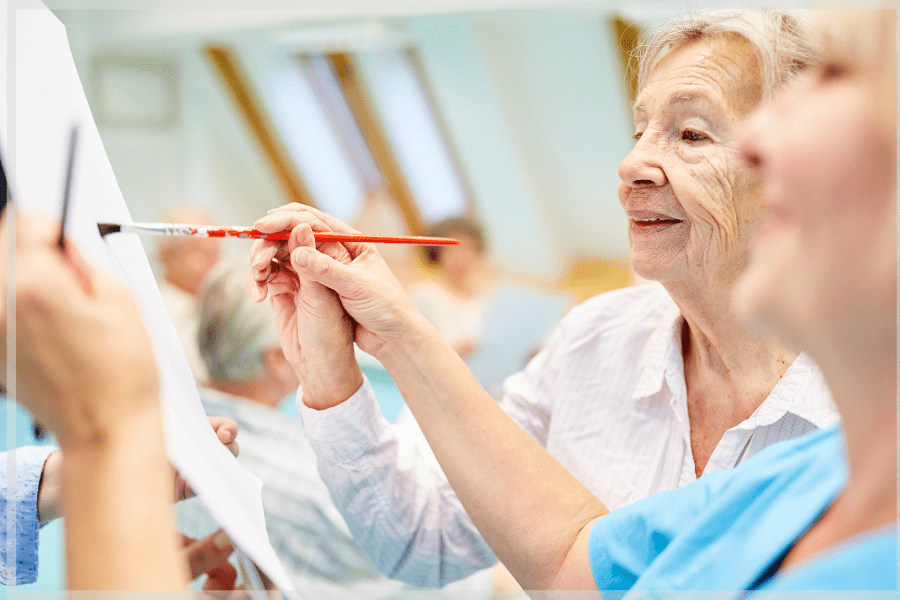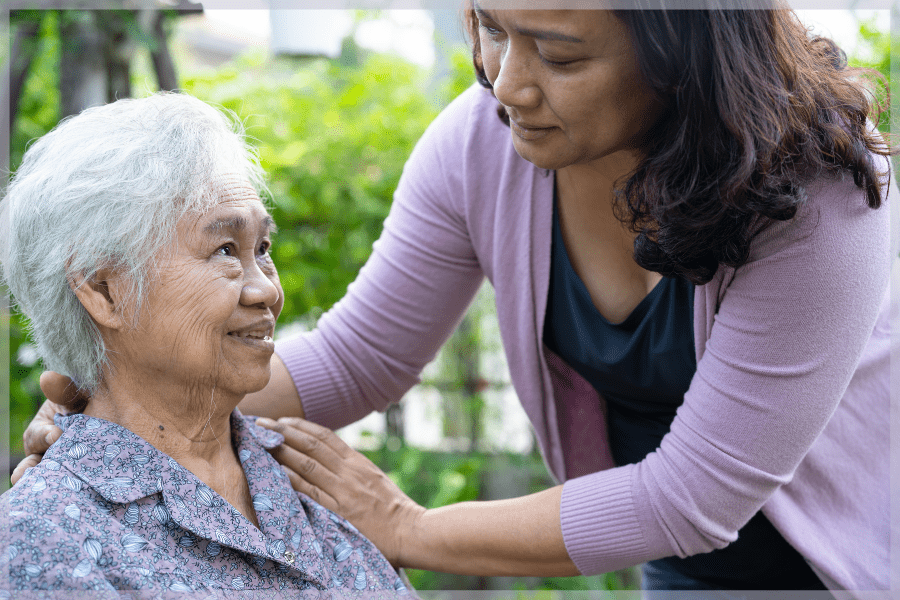
The Different Types Of Caregivers
- Category: Behavior Services
- Date: 18-10-2025
According to AARP, 90% of seniors wish to age in place. But for many, aging at home safely and comfortably may not be possible without extra help. So when it comes time to find a caregiver for your aging family member, it’s essential to know the difference between the different types of caregivers. That’s because when you empower yourself with the right information, you ensure that your loved one receives the best care.
The different types of caregivers generally fall into two broad categories: informal caregivers and progressional caregivers. Informal caregivers include family caregivers and volunteers, who typically offer companionship or light housekeeping. On the other hand, professional caregivers refer to a broader variety of trained health professionals, each with their own unique skills and requirements.
Jump To Your Section
-
Adult Day Care Facility Caregivers
-
Agency Caregivers
-
Assisted Living Facility Caregivers
-
Certified Nursing Assistants
-
Family Caregivers
-
Home Health Aides
-
Hospice And Palliative Caregivers
-
Independent Caregivers
-
Informal Caregivers
-
Non-Medical Caregivers
-
Personal Care Attendants
-
Private-Duty Caregivers
-
Senior Facility Caregivers
-
Skilled Nursing Home Caregivers
-
Virtual Caregivers
-
Volunteer Caregivers
-
MeetCaregivers Can Help
What Are The Different Types Of Caregivers?
The different types of caregivers generally fall into two broad categories: informal caregivers and progressional caregivers. Informal caregivers include family caregivers and volunteers, who typically offer companionship or light housekeeping. On the other hand, professional caregivers refer to a broader variety of trained health professionals, each with their own unique skills and requirements.
Adult Day Care Facility Caregivers
Adult day care facilities provide medical care, supervision, education, and social support for the elderly and people with disabilities. In addition, these facilities are an important source of social support for clients, so these types of caregivers often provide transportation and supervision for outings and other social activities.
Agency Caregivers
Generally, most senior care professionals work as agency caregivers. These types of caregivers work for aged care providers who contract them out to nursing homes, private clients, or hospices. Most agencies require these types of caregivers to have their CNA license.
Assisted Living Facility Caregivers

Adult day care facilities are also beneficial options for family caregivers needing respite.
Assisted living facility caregivers typically care for seniors with the physical and cognitive ability to live semi-independently but who need extra help from nursing aids during the week.
Certified Nursing Assistants
Certified Nursing Assistants (CNAs) perform medical-related tasks such as taking vital signs, changing dressings, cleaning catheters, controlling infections, and administering treatments. Unlike PCAs and HHAs, CNAs may work under a Registered Nurse (RN) or Nurse Practitioner’s (NP) supervision. CNAs may also work in rehabilitation hospitals, daycare centers, and skilled nursing facilities.
Family Caregivers
Family caregivers offer emotional, financial, nursing, social, homemaking, and other assistance daily or temporarily for an elderly, frail, ill, or disabled loved one. In most cases, family caregivers offer this support without pay.
Home Health Aides
Home Health Aides (HHAs) also provide personal care at home. However, they can also work in retirement communities, assisted living facilities, group homes, or other transitional housing.
Hospice And Palliative Caregivers
Hospice and palliative caregivers support comfort and quality of life for clients facing end-of-life conditions. These types of caregivers also work closely with families to ease their suffering as well.

The millions of informal caregivers in the US play an instrumental role in supporting the country's aging population.
Independent Caregivers
Private families hire independent caregivers to deliver individualized in-home care. This role focuses on relationship-building and social connection to keep clients engaged and connected. These types of caregivers often have more experience because it can take several years to build the skills and knowledge necessary to work independently.
Informal Caregivers
Informal caregivers include family caregivers, but it also refers to a neighbor, friend, or anyone with a personal relationship with the care recipient who volunteers their time, typically without pay.
Non-Medical Caregivers
Non-medical caregivers refer to Personal Care Attendants (PCAs), Homemakers, Companions, and other professionals who provide low-touch support for seniors and disabled patients. These types of caregivers help with everyday homemaking and companion care activities such as cooking, cleaning, bathing, dressing, toileting, moving around, running errands, and performing light housekeeping tasks.
Personal Care Attendants
PCAs provide care within clients’ homes and help with daily activities such as bathing, shopping, housework, and more. These types of caregivers are ideal for semi-independent older adults who need moderate support.
Private-Duty Caregivers
Private-duty caregivers support seniors and their families through various services, including personal and nursing care, bill payments, and transportation. In addition, these types of caregivers focus on helping their clients retain their independence at home.
Senior Facility Caregivers
Senior facility caregivers work with the elderly in nursing homes to support their mental, physical, and emotional health. Although outside agencies often help staff many facilities, some larger nursing homes may directly employ their caregivers. Senior facility caregivers support patients’ mental, physical, and emotional health in their advanced years.
Skilled Nursing Home Caregivers
Skilled nursing home caregivers provide specialized care such as physiotherapy, in-home medical care, and more. These types of caregivers typically provide short-term services until the client’s health has stabilized and a general caregiver can step in to provide continued care.
Virtual Caregivers
Virtual caregivers utilize telehealth services to assist patients who don’t require physical support. These types of caregivers routinely call or meet clients online to discuss their needs and challenges, provide medication reminders, and guide them through in-home modifications that enhance their quality of life. Some virtual caregivers follow a hybrid care model so they can also make periodic physical assessments.
Volunteer Caregivers
Volunteer caregivers typically provide respite or hospice care. This type of caregiver usually provides respite breaks for informal caregivers and assists with tasks such as companionship, supervision, and support.
